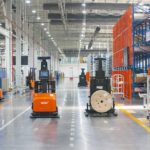Yichang Qingkui Robot Technology Co., Ltd. Chairman Chen Nanjiang (center) instructs engineers in assembling the AI chemistry robot.
“Two fully automated robotic arms, like the hands of a lab technician, can automatically complete reagent loading, precise sample addition, and mixing. Just set the reaction parameters, and a single unit can complete 800 experiments per day.” On August 25, in the production workshop of Yichang Qingkui Robot Technology Co., Ltd. located in Qiaobian Town, Dianjun District, Yichang City, Chairman Dr. Chen Nanjiang introduced.
This uninterrupted, full-process organic synthesis robot being assembled will complete debugging by the end of September and then be shipped to the Singapore Agency for Science, Technology and Research’s Institute of Materials Research and Engineering, marking the first export of an AI chemistry robot made in Yichang.
“This product has already been put into use at the State Key Laboratory of the Shanghai Institute of Organic Chemistry, Chinese Academy of Sciences. The Singapore Agency for Science, Technology and Research showed great interest during an exchange in Shanghai in March. After contacting us, they reached a cooperation intent and signed a memorandum of understanding in Singapore in May. The first unit will be delivered in October, with the remainder to be delivered next year.” Chen Nanjiang said that to accommodate these overseas “guests,” the Singapore Agency for Science, Technology and Research is building a new laboratory.
The Singapore Agency for Science, Technology and Research is Singapore’s leading statutory agency for scientific research and industrial innovation, and also the country’s largest comprehensive research institution. These AI chemistry robots will be used for the synthesis and screening of new materials (such as catalysts, polymer materials, etc.), helping researchers quickly conduct large-scale reaction condition screening.
“Globally, it is a growing trend for robots to replace manual experimentation. We are very confident about entering the local market and are currently in discussions with universities such as the National University of Singapore and Nanyang Technological University.” Chen Nanjiang explained that this robot can perform organic chemistry synthesis experiments 24 hours a day without interruption, accurately completing processes such as solid weighing, liquid handling, reaction monitoring, and result analysis.
In addition to significantly increasing experimental speed, the robot also offers greater precision and safety. “The error rate of the best lab technicians is around 3.5%, while this robot can control the error rate within 2%.” Chen Nanjiang said, “Organic synthesis carries explosion risks. Using robots for experiments ensures that even if an accident occurs, it won’t affect personal safety.”
Currently, Qingkui chemistry robot products have been applied in fields such as chemicals and pharmaceuticals, greatly improving corporate research efficiency. The “Super Intelligent Chemical Synthesis Cloud Laboratory” that Qingkui Company is preparing to build represents a leap from “selling hardware” to “selling services.”
“Many basic experiments have commonalities. Experimental data stored in the cloud can provide reference for corporate product development after big data analysis. Combined with a large amount of experimental data, reaction strategies can also be optimized through algorithms, greatly shortening the development cycle of new materials and new drugs.” Chen Nanjiang is very confident about the cloud laboratory.




